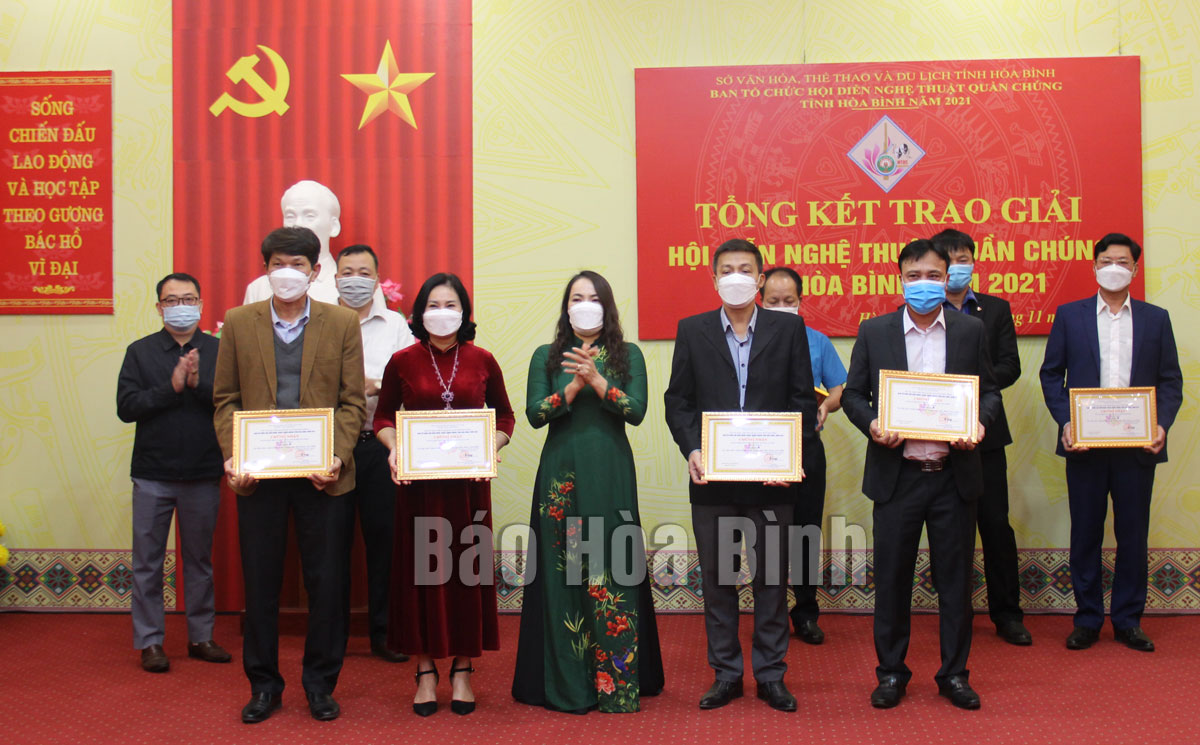
(HBO) - On November 25th, the provincial Department of Culture, Sports and Tourism held a summary and award ceremony of the Provincial Festival of Mass Performing Arts in 2021.

The leaders from Department of
Culture, Sports and Tourism are awarding prizes to the units with excellent
performances.
Due to the complicated development
of Covid-19 epidemics, the Department of Culture, Sports and Tourism did not
organize the Festival of Mass Performing Arts centrally, it was organized in an
indirect form. The localities selected actors, developed the content, staged
the program, made video clips and then sent them to attend the festival. This
was the first year a new form had been implemented to ensure the professional
tasks and as well as to implement the regulations on the prevention and control
of Covid-19 epidemics.
More than 50 performances of the
special songs, dances and music praising the Party, the homeland, the homeland
of Hoa Binh, especially celebrating 135 years of establishment of the province
and 30 years of re-establishing the province were built and elaborately staged,
recorded and sent to the fesstival. Most of the programs and the performances
of songs, dances and music were imbued with the traditional culture and the
national cultural identity.
Through the programs sent to the
festival, the Organizing Committee has chosen 8 A prizes, 18 B prizes, 24 C
prizes in the genre of songs, dances, and music and they awarded 4 A prizes, 6
B prizes to the units with the best recorded performance. Good recording
program. In which, 8 A prizes in the genre of songs, dances and music were
awarded for the following performances: Muong folk songs: Moi Trau, U hay, Dap
Khot lady(Lac Son); singing and dancing: Hoa Binh -135 years (Hoa Binh city);
male solo: Hoa Binh - past and present (Lac Thuy); dance: The sacred soul of
Muong land (Hoa Binh city); the dance: the Stream Source (Lac Son); the dance:
Golden Tray Festival (Yen Thuy); The instrumental concert: The rhythm of life
in Muong land (Hoa Binh city); the concert of Muong Gongs: Ben Ram Song Bo,
Praising Land Praising Muong, Tram Kham (Lac Son).
With an increasingly vibrant and widespread emulation movement aimed at building cultured residential areas and cultured families, Yen Thuy District has been making steady progress toward improving both the material and spiritual well-being of its people, while fostering a civilized, prosperous, beautiful, and progressive community.
Once lacking recreational spaces and community facilities, Residential Group 2 in Quynh Lam Ward (Hoa Binh City) has recently received attention for the construction of a new, spacious, and fully equipped cultural house. The project followed the model of state support combined with public contributions in both labor and funding.
The "All people unite to build cultural life" movement, which has been effectively integrated with Kim Boi district’s socio-economic development goals, is fostering a lively spirit of emulation across local residential areas, hamlets, villages, public agencies, and enterprises. In addition, through the initiative, traditional cultural values are being preserved and promoted, while community solidarity and mutual support in poverty reduction and economic development are being strengthened.
A working delegation of the Hoa Binh provincial People’s Committee led by its Permanent Vice Chairman Nguyen Van Toan on June 11 inspected the progress of a project to build the Mo Muong Cultural Heritage Conservation Space linked to tourism services in Hop Phong commune, Cao Phong district.
Born and growing in the heroic land of Muong Dong, Dinh Thi Kieu Dung, a resident in Bo town of Kim Boi district, in her childhood was nurtured by the sweet lullabies of her grandmother and mother. These melodies deeply imprinted on her soul, becoming an inseparable part of her love for her ethnic group's culture. For over 20 years, this love for her hometown has driven Dung to research, collect, and pass down the cultural values of the Muong people to future generations.
In the final days of May, the Ethnic Art Troupe of Hoa Binh Province organized performances to serve the people in remote, mountainous, and particularly disadvantaged areas within the province. These were not just ordinary artistic shows, but they were the meaningful journeys aimed at spreading cultural values, enhancing the spiritual life of the people and contributing to the preservation of ethnic minority cultural identities.



